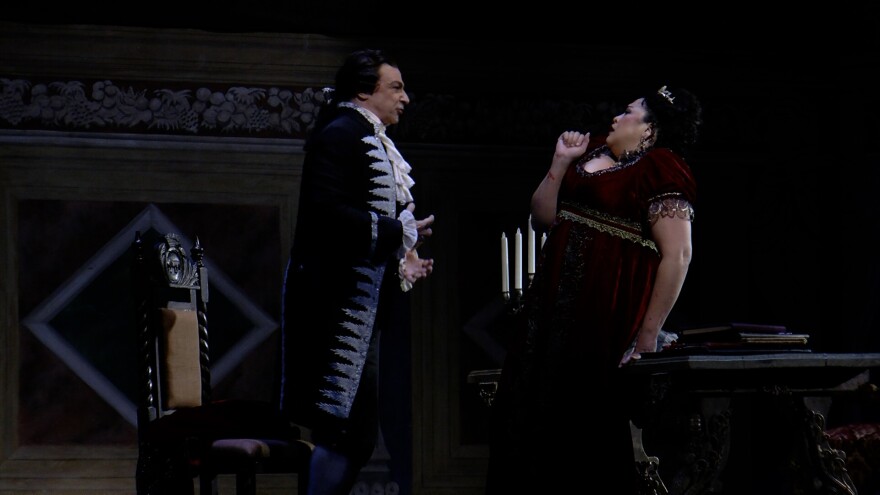San Diego Opera is showcasing modern operas and even a world premiere one next month but it’s also serving up grand opera with its production of Puccini’s "Tosca."
When Darth Vader first appears in "Star Wars," John Williams’ score tells you everything you need to know.
Operas have known the power of music to define a character for centuries. You don’t have to see Scarpia enter in Act I of "Tosca," you only have to hear the ominous notes to know he's the Darth Vader of the opera.
"With the cape and the whole thing, yes, exactly," said Alan Hicks, who is directing "Tosca" for San Diego Opera. "And his minions sort of push everybody aside and it's the first moment we see him and it is very much like Darth Vader. From the moment he walks in, you are afraid of him, and everyone on stage is afraid of him. And even the people who aren't afraid of him are still afraid of him."
Baritone Greer Grimsley sang the role of Scarpia for San Diego Opera in 2016, and he returns to play the corrupt police chief.
"You very seldom get an entrance like that," Grimsley said with glee. "And I just make the most of it."
And Hicks loves what Grimsley brings to the role.

"He's very tall, very statuesque and so he brings this physical presence to the role — this sort of ominous physical presence," Hicks said. "But he also brings this very calculating quality. Some of his looks and some of his pensiveness on stage, you really see into his brain and you see him calculating his next move. And that, from an acting standpoint, is just gold for Scarpia."
He's a character we love to hate.
"He's a very educated man, and you would not expect someone to be as villainous as he is with as much education as he has," Grimsley said. "So somewhere there's a disconnect where he believes he's doing the right thing, which garners him a certain amount of privilege along the way. So the privilege is the parentheses around his permission to clean out the revolutionaries. He enjoys what he does, but he doesn't see it as villainous. And I think if you play any villain as someone who is just a bad guy, then you lose a certain amount of interest."
But neither Grimsley nor "Tosca" let us lose interest. The opera serves up melodrama on a compelling, larger than life scale. The story is set against political turmoil in Rome in the year 1800. We have a fiery diva named Tosca, her idealistic lover Cavaradossi, and the sadistic Scarpia.

"Scarpia is a very complex character," Hicks said. "I feel like he truly is a believer that the papal state, the Church state, is the righteous way, but he's also a human being, which means he has flaws."
And that’s where Grimsley sees the timelessness of the story.
"It's about the abuse of power, it's about the abuse of privilege," Grimsley said. "I've said ever since I started doing the role that it's a cautionary tale for all of us, that when someone is in too much power politically, and it's not necessarily the leader a lot of times, that the whole society can go off a kilter."
That might sound very familiar to those of us who have witnessed America’s political scene recently. But for Hicks, who considers himself a "history nerd," it’s also important to keep the opera set in its specific time period.
"There is a dramatic arc in the piece that talks about the Battle of Marengo, that Napoleonism is coming, which is this idea of freedom and liberty and not being in a Church state, but having freedom and liberty to do as you please," Hicks explained. "That's what Napoleon is bringing. And there are sympathizers in Rome at the time. Our lead, our tenor, Cavaradossi, is one of them and he actually is trying to help that idea come into Rome. So that's a very important part and one of the reasons I feel like it's very difficult to do 'Tosca' in a different era than it's set."
Just because it’s set a long time ago, doesn’t mean it can’t resonate with a modern audience.
"One sovereign power encroaching on another, religious fervor, corruption in power — I think all of these things are common themes," Hicks said. "So it's very easy to understand what's happening. There's no existentialism. It's pretty straightforward."
Because it’s about very primal things like love, murder, betrayal and passion. Just like "Star Wars." I mean there’s a reason it’s called a space opera. There’s a clear lineage from the likes of Puccini’s Scarpia to George Lucas’ Darth Vader and that is something worth celebrating.
And just for fun: The very first opera story I did was in 2012 about San Diego Opera's "Salome." That was my first introduction to Grimsley but only as a severed head. He was playing John the Baptist and my story was about the special effects in the production, most notably blood and a severed head. So enjoy!










